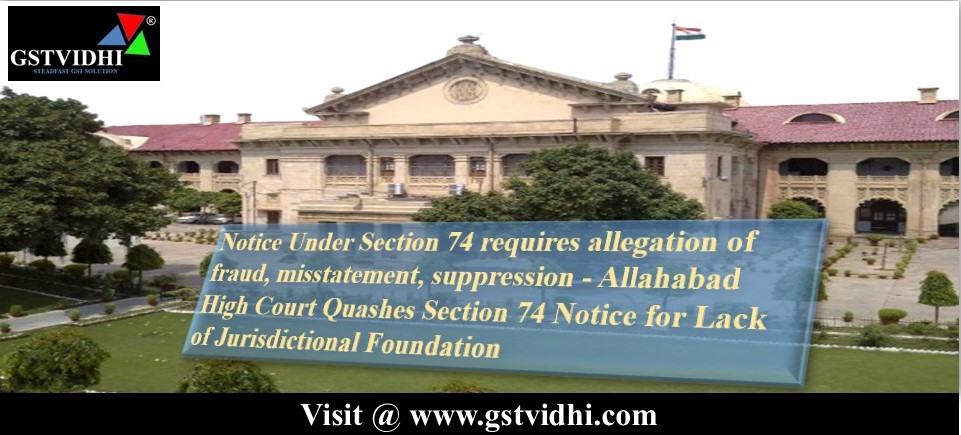
Notice Under Section 74 requires allegation of fraud,
misstatement, suppression - Allahabad High Court Quashes Section 74 Notice for
Lack of Jurisdictional Foundation
Bharat
Mint & Allied Chemicals v. State of U.P. & Another (Writ Tax No. 2527
of 2025 | Order Date: 30 May 2025 | Allahabad High Court
Summary
The Allahabad High Court
in a landmark ruling has quashed a notice issued under Section 74 of the
CGST/SGST Act to Bharat Mint & Allied Chemicals, citing that the statutory preconditions
for invoking Section 74 were absent in the notice. The court held that when a
previous Section 73 proceeding accepted the taxpayer’s explanation, and no
allegation of fraud, misstatement, or suppression was made, issuing a
subsequent Section 74 notice on the same issues was without jurisdiction.
This judgment reinforces
judicial scrutiny over arbitrary escalation from Section 73 to Section 74, and
ensures that increased penal consequences under Section 74 cannot be invoked without
due cause.
Background
Facts
1. The
petitioner, Bharat Mint & Allied Chemicals, was initially issued a Show
Cause Notice (SCN) under Section 73 of the CGST/SGST Act, citing ten issues of
discrepancies and mismatches in GST returns and disclosures.
2. The
petitioner submitted a detailed reply to the Section 73 notice, and the
adjudicating authority passed an order under Section 73(9) on 20 February 2025.
3. In
that order, the authority accepted the petitioner’s response on six issues, but
deferred decision on issues 1, 6, 8, and 10, stating that further investigation
was needed, and that a separate notice would be issued.
4. Subsequently,
the department issued a fresh notice under Section 74 of the CGST Act on 25
February 2025, pertaining to the same issues earlier left open in the Section
73 proceedings.
5. Aggrieved,
the petitioner approached the High Court, contending that the Section 74 notice
was wholly without jurisdiction.
Legal
Issues for Consideration
1. Can
a notice under Section 74 be issued after an order under Section 73, covering
the same issues, without any allegation of:
o Fraud;
o Wilful
misstatement; or
o Suppression
of facts?
2. Is
it legally valid to escalate a matter from Section 73 to Section 74 based on
insufficiency of time or pending investigation alone?
3. Does
the Section 74 notice satisfy the jurisdictional threshold required under the
Act?
Petitioner’s
Submissions
- The Section 74 notice was devoid of
the foundational jurisdictional facts required under the provision.
- There was no allegation of fraud,
wilful misstatement or suppression in the notice or the preceding order
under Section 73(9).
- The language of Section 74 requires
these elements to be clearly invoked for its application, failing which
the notice is ultra vires and liable to be quashed.
- The petitioner relied heavily on the
decision of the same Court in M/s Vadilal Enterprises Ltd. v. State of
U.P., Writ Tax No. 2486 of 2025, decided on 23 May 2025, which
involved identical facts and the same adjudicating officer.
Respondents’
Submissions
- The State’s Counsel argued that the facts
underlying the discrepancies themselves indicated suppression, and hence no
specific recital of Section 74 ingredients was necessary.
- The language of the notice need not
mirror the statute, as long as the intent is discernible.
- However, the respondent did not deny
that the facts of the Vadilal Enterprises case were similar to the present
one.
Section 74
of the CGST Act
This section provides for
demand of tax along with interest and penalty, where tax is not paid
or short paid due to fraud, wilful misstatement or suppression of facts.
Penalty under Section 74 is 100% of the tax amount, unlike Section 73,
where penalty is limited to 10%.
The Court’s
Analysis and Findings
1. Jurisdictional
Preconditions Not Met
The Court noted that for
Section 74 to be invoked, it is essential that:
“There must be clear
allegations and basis for believing that the assessee has indulged in fraud,
wilful misstatement, or suppression.”
In this case, the Section
74 notice was silent on any such allegation.
“The very fact that the
respondents have sought further explanation and not a word has been indicated
that the petitioner... has committed fraud, wilful misstatement or suppressed
material facts... necessarily shows lack of requisite ingredients in the notice.”
2. Vadilal Enterprises
Case Applied
The Court found that the facts
of the present case were squarely covered by its own judgment in M/s
Vadilal Enterprises Ltd., where it held:
“...while deciding the
notice under Section 73, finding paucity of time, the officer left the issues
undecided and issued notice under Section 74—this method is legally
unsustainable.”
3. Notice Under Section
74 Set Aside
The Court held that absent
jurisdictional facts, a Section 74 notice cannot be sustained, and
hence must be quashed in toto.
Final Judgment
1. Writ
Petition Allowed: The High Court allowed the writ petition
filed by Bharat Mint & Allied Chemicals.
2. Notice
Under Section 74 Quashed: The impugned notice dated 25
February 2025, issued under Section 74, was quashed and set aside.
3. Fresh
Proceedings Permitted: The Court clarified that the department
is free to initiate fresh proceedings in accordance with law, if
jurisdictional ingredients are properly established.
Conclusion:
This ruling serves as a safeguard
against arbitrary tax enforcement and reaffirms the doctrine that penalty-enhancing
provisions must be strictly construed. It also:
- Discourages GST authorities from issuing
Section 74 notices casually;
- Emphasizes that failure to decide
under Section 73 due to time or administrative burden is no ground
to invoke Section 74;
- Encourages taxpayers to challenge
mechanically issued show cause notices.
Disclaimer: All the Information is based on the notification, circular and order issued by the Govt. authority and judgement delivered by the court or the authority information is strictly for educational purposes and on the basis of our best understanding of laws & not binding on anyone.
Press On Click Here To Download File
Click here